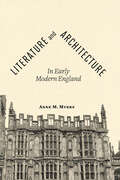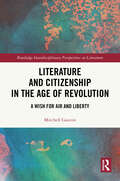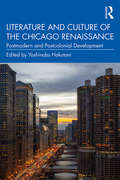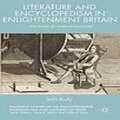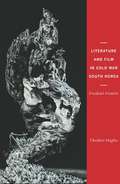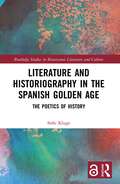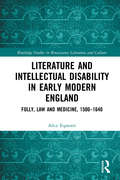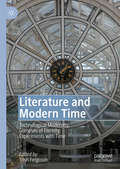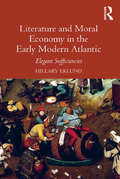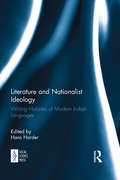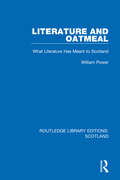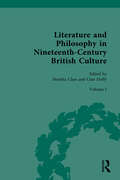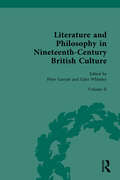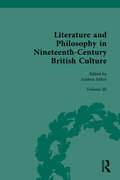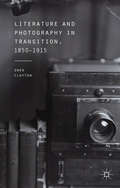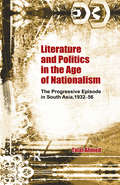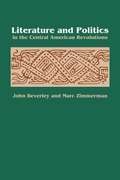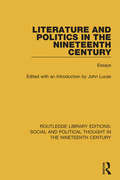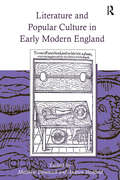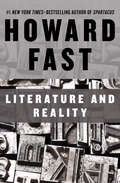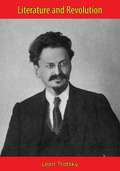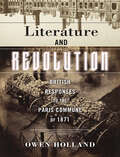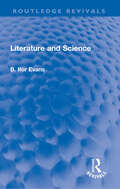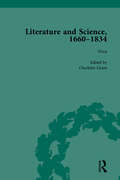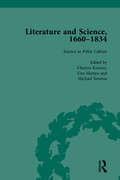- Table View
- List View
Literature and Architecture in Early Modern England
by Anne M. MyersOur built environment inspires writers to reflect on the human experience, discover its history, or make it up.Buildings tell stories. Castles, country homes, churches, and monasteries are "documents" of the people who built them, owned them, lived and died in them, inherited and saved or destroyed them, and recorded their histories. Literature and Architecture in Early Modern England examines the relationship between sixteenth- and seventeenth-century architectural and literary works. By becoming more sensitive to the narrative functions of architecture, Anne M. Myers argues, we begin to understand how a range of writers viewed and made use of the material built environment that surrounded the production of early modern texts in England. Scholars have long found themselves in the position of excusing or explaining England’s failure to achieve the equivalent of the Italian Renaissance in the visual arts. Myers proposes that architecture inspired an unusual amount of historiographic and literary production, including poetry, drama, architectural treatises, and diaries. Works by William Camden, Henry Wotton, Ben Jonson, Andrew Marvell, George Herbert, Anne Clifford, and John Evelyn, when considered as a group, are texts that overturn the engrained critical notion that a Protestant fear of idolatry sentenced the visual arts and architecture in England to a state of suspicion and neglect.
Literature and Citizenship in the Age of Revolution: A Wish for Air and Liberty (Routledge Interdisciplinary Perspectives on Literature)
by Mitchell GauvinCitizenship is at the forefront of popular imagination as political movements and state governments around the world traffic in anti-immigrant rhetoric and call for increased policing of borders. Literature and Citizenship in the Age of Revolution: A Wish for Air and Liberty looks back to a critical historical juncture in the development of citizenship to uncover how literature contoured and contested imaginings of citizenship. While territory and the nation-state often frame our understanding of citizenship, this book focuses on how non-citizens, foreigners, and strangers have long been central to citizenship’s coherence. Rather than rootedness, literary texts exposed the circulations of persons, ideas, and affections at the heart of citizenship. This book brings together an unlikely combination of writers—Olaudah Equiano, Jane Austen, Mary Shelley, and Herman Melville—to show how literature in the Age of Revolution exposed contradictions in notions of liberty and slavery that impacted how citizenship was conceived and practiced.
Literature and Culture of the Chicago Renaissance: Postmodern and Postcolonial Development
by Yoshinobu HakutaniThe Chicago Renaissance has long been considered a less important literary movement than the Harlem Renaissance. While the Harlem Renaissance began and flourished during the 1920s, but faded during the 1930s, the Chicago Renaissance originated between 1890 and 1910, gathered momentum in the 1930s, and paved the way for the postmodern and postcolonial developments in American Literature. To portray Chicago as a modern, spacious, cosmopolitan city, the writers of the Chicago Renaissance developed a new style of writing based on a distinct cultural aesthetic that reflected ethnically diverse sentiments and aspirations. Whereas the Harlem Renaissance was dominated by African American writers, the Chicago Renaissance originated from the interactions between African and European American writers. Much like modern jazz, writings in the movement became a hybrid, cross-cultural product of black and white Americans. The second period of the movement developed at two stages. In the first stage, the older generation of African American writers continued to deal with racial issues. In the second stage, African American writers sought solutions to racism by comparing American culture with other cultures. The younger generation of African American writers, such as Ishmael Reed, Charles Johnson, and Colson Whitehead, followed their predecessors and explored Confucianism, Buddhist Ontology, and Zen. This volume features essays by both veteran African Americanists and upcoming young critics. It is highlighted by essays from scholars located around the globe, such as Toru Kiuchi of Japan, Yupei Zhou of China, Mamoun Alzoubi of Jordan, and Babacar M'Baye of Senegal. It will be invaluable reading for students of Americanists at all levels.
Literature and Encyclopedism in Enlightenment Britain
by Seth RudyAt a moment when Google seeks "to organize the world's information and make it universally accessible and useful," this book tells the story of long-term aspirations, first in ancient epic and then in a wide range of literary and non-literary works from the early modern era and British Enlightenment, to comprehend, record, and disseminate complete knowledge of the world. It is also a story of the persistent failure of these aspirations, their collapse in the late eighteenth century, and the subsequent redefinition of completeness in modern literary and disciplinary terms. The book argues that the pursuit of complete knowledge advanced the separation of epic from encyclopedia, literature from "Literature," and the sciences from the humanities; it demonstrates that the distinctions between "high" and "low," ephemeral and eternal, useful and useless that persist today all stem from the concepts of completeness that emerged during and as a result of the Enlightenment.
Literature and Film in Cold War South Korea: Freedom's Frontier (Columbia Studies In Terrorism And Irregular Warfare Ser.)
by Theodore HughesKorean writers and filmmakers crossed literary and visual cultures in multilayered ways under Japanese colonial rule (1910–1945). Taking advantage of new modes and media that emerged in the early twentieth century, these artists sought subtle strategies for representing the realities of colonialism and global modernity. Theodore Hughes begins by unpacking the relations among literature, film, and art in Korea's colonial period, paying particular attention to the emerging proletarian movement, literary modernism, nativism, and wartime mobilization. He then demonstrates how these developments informed the efforts of post-1945 writers and filmmakers as they confronted the aftershocks of colonialism and the formation of separate regimes in North and South Korea. Hughes puts neglected Korean literary texts, art, and film into conversation with studies on Japanese imperialism and Korea's colonial history. At the same time, he locates post-1945 South Korean cultural production within the transnational circulation of texts, ideas, and images that took place in the first three decades of the Cold War. The incorporation of the Korean Peninsula into the global Cold War order, Hughes argues, must be understood through the politics of the visual. In Literature and Film in Cold War South Korea, he identifies ways of seeing that are central to the organization of a postcolonial culture of division, authoritarianism, and modernization.
Literature and Historiography in the Spanish Golden Age: The Poetics of History (Routledge Studies in Renaissance Literature and Culture)
by Sofie KlugeGolden Age departures in historiography and theory of history in some ways prepared the ground for modern historical methods and ideas about historical factuality. At the same time, they fed into the period’s own "aesthetic-historical culture" which amalgamated fact and fiction in ways modern historians would consider counterfactual: a culture where imaginative historical prose, poetry and drama self-consciously rivalled the accounts of royal chroniclers and the dispatches of diplomatic envoys; a culture dominated by a notion of truth in which skilful construction of the argument and exemplarity took precedence over factual accuracy. Literature and Historiography in the Spanish Golden Age: The Poetics of History investigates this grey area backdrop of modern ideas about history, delving into a variety of Golden Age aesthetic-historical works which cannot be satisfactorily described as either works of literature or works of historiography but which belong in between these later strictly separate categories.
Literature and Intellectual Disability in Early Modern England: Folly, Law and Medicine, 1500-1640 (Routledge Studies in Renaissance Literature and Culture)
by Alice EquestriFools and clowns were widely popular characters employed in early modern drama, prose texts and poems mainly as laughter makers, or also as ludicrous metaphorical embodiments of human failures. Literature and Intellectual Disability in Early Modern England: Folly, Law and Medicine, 1500–1640 pays full attention to the intellectual difference of fools, rather than just their performativity: what does their total, partial, or even pretended ‘irrationality’ entail in terms of non-standard psychology or behaviour, and others’ perception of them? Is it possible to offer a close contextualised examination of the meaning of folly in literature as a disability? And how did real people having intellectual disabilities in the Renaissance period influence the representation and subjectivity of literary fools? Alice Equestri answers these and other questions by investigating the wide range of significant connections between the characters and Renaissance legal and medical knowledge as presented in legal records, dictionaries, handbooks, and texts of medicine, natural philosophy, and physiognomy. Furthermore, by bringing early modern folly in closer dialogue with the burgeoning fields of disability studies and disability theory, this study considers multiple sides of the argument in the historical disability experience: intellectual disability as a variation in the person and as a difference which both society and the individual construct or respond to. Early modern literary fools’ characterisation then emerges as stemming from either a realistic or also from a symbolical or rhetorical representation of intellectual disability.
Literature and Modern Time: Technological Modernity; Glimpses of Eternity; Experiments with Time
by Trish FergusonLiterature and Modern Time is a collection of essays that explore literature in the context of a wave of challenges to linear conceptions of time introduced by thinkers such as Bergson, Einstein, McTaggart, Freud and Nietzsche. These challenges were not uniform in character. The volume will demonstrate that literature of the era under scrutiny was not simply reacting to new theories of time—in some cases it is actually inspiring and anticipating them. Thus Literature and Modern Time promises to offer a genuine dialogue between literature and time theory and in doing so will uncover and examine influences and connections— sometimes unexpected—between philosophers and writers of the era. It will examine literary attempts to transcend and escape time and also challenge rupture-based accounts of modernist time by demonstrating that literary texts commonly associated with brokenness, decline or stasis, also, at the same time, maintain faith in healing, renewal and mobility.This collection contains interdisciplinary research of the quite highest kind - to see so many different kinds of time - narrative, historical, mechanical, subjective, non-linear time, myth and nostalgia - as well as time/space discussed here is very stimulating indeed.Professor Simon James
Literature and Moral Economy in the Early Modern Atlantic: Elegant Sufficiencies
by Hillary EklundGrounded in the literary history of early modern England, this study explores the intersection of cultural attitudes and material practices that shape the acquisition, circulation, and consumption of resources at the turn of the seventeenth century. Considering a formally diverse and ideologically rich array of texts from the period - including drama, poetry, and prose, as well as travel narrative and early modern political and literary theory - this book shows how ideas about what is considered 'enough' adapt to changing material conditions and how cultural forces shape those adaptations. Literature and Moral Economy in the Early Modern Atlantic traces how early modern English authors improvised new models of sufficiency that pushed back the threshold of excess to the frontier of the known world itself. The book argues that standards of economic sufficiency as expressed through literature moved from subsistence toward the increasing pursuit of plenty through plunder, trade, and plantation. Author Hillary Eklund describes what it means to have enough in the moral economies of eating, travel, trade, land use and public policy.
Literature and Nationalist Ideology: Writing Histories of Modern Indian Languages (Ssp Ser.)
by Hans HarderWriting histories of literature means making selections, passing value judgments, and incorporating or rejecting foregoing traditions. The book argues that in many parts of India, literary histories play an important role in creating a cultural ethos. They are closely linked with nationalism in general and various regional ‘sub-nationalisms’ in particular. The contributors to this volume look at a great variety of aspects of the historiography of modern regional languages of India. Please note: Taylor & Francis does not sell or distribute the Hardback in India, Pakistan, Nepal, Bhutan, Bangladesh and Sri Lanka
Literature and Oatmeal (Routledge Library Editions: Scotland #26)
by William PowerOriginally published in 1935, this book’s author was both a nationalist and internationalist who believed that these positions were complementary, not in conflict with each other. This concise volume doesn’t merely discuss the significance of literature in Scottish history but also charts that literary heritage. Examining native and foreign influences from Ireland and Scandinavia, the book also examines the role literature has played in the formation of the national identity of Scotland.
Literature and Philosophy in Nineteenth-Century British Culture: Volume I: Literature and Philosophy of the Romantic Period
by Cian Duffy Giles Whiteley Monika ClassThis is the first volume in a three-volume collection of primary sources which examines philosophy and literature in nineteenth-century Britain. Accompanied by extensive editorial commentary, this collection will be of great interest to students and scholars of British Literature and Philosophy.
Literature and Philosophy in Nineteenth-Century British Culture: Volume II: The Mid-Nineteenth Century
by Peter Garratt Giles WhiteleyThis is the second volume in a three-volume collection of primary sources which examines philosophy and literature in nineteenth-century Britain. Accompanied by extensive editorial commentary, this collection will be of great interest to students and scholars of British Literature and Philosophy.
Literature and Philosophy in Nineteenth-Century British Culture: Volume III: Literature and Philosophy in the ‘Long-Late-Victorian’ Period
by Andrea Selleri Giles WhiteleyThis three-volume collection of primary sources examines philosophy and literature in the nineteenth-century Britain. Accompanied by extensive editorial commentary, this collection will be of great interest to students and scholars of British Literature and Philosophy.
Literature and Photography in Transition, 1850-1915
by O. ClaytonLiterature and Photography in Transition, 1850-1915 examines how British and American writers used early photography and film as illustrations and metaphors. It concentrates on five figures in particular: Henry Mayhew, Robert Louis Stevenson, Amy Levy, William Dean Howells, and Jack London.
Literature and Politics in the Age of Nationalism: The Progressive Episode in South Asia, 1932-56
by Talat AhmedThis book aims to provide a historical account of the All-India Progressive Writers’ Association (AIPWA). In a structured narrative, it focuses on the political processes inside India, events and circumstances in South Asia and the debates and literary movements in Europe and the United States to demonstrate how the literary project was specifically informed by literary-political movements. It explores the theorisation of literature and politics that informed progressive writing and argues that the progressive conception of literature, art and politics was closer to the theorisation of two thinkers of whom the writers themselves knew very little – Leon Trotsky and Antonio Gramsci. The book charts the progressive movement’s extension into the cultural arena through the Indian People’s Theatre Association (IPTA) and the deepening of its nation-wide character through a progressive nationalism instilled with left-wing ideology. One of the important aims of the AIPWA project was to advance the development of a popular vernacular based on the demotic language of north India – Hindustani. The book locates this issue within the broader nationalist discussion on the national language. Contrary to what is implied by much of the previous scholarship, the book argues that the progressive movement did survive the ravages of partition and that the progressives maintained organisations in both India and Pakistan. It looks at the short-lived but very colourful history of the PWA in Pakistan, using PWA documents, government records and personal testimonies. Arguing that literary output and cultural production cannot be understood, let alone interpreted, outside the context of the nationalist movement, war, independence and partition, the book presents a narrative that necessarily transcends disciplinary boundaries between literature, politics and history. Supplemented with literary and archival sources and oral testimonies from the members of the movement, it pr
Literature and Politics in the Central American Revolutions
by John Beverley Marc Zimmerman"This book began in what seemed like a counterfactual intuition . . . that what had been happening in Nicaraguan poetry was essential to the victory of the Nicaraguan Revolution," write John Beverley and Marc Zimmerman. "In our own postmodern North American culture, we are long past thinking of literature as mattering much at all in the 'real' world, so how could this be?" This study sets out to answer that question by showing how literature has been an agent of the revolutionary process in Nicaragua, El Salvador, and Guatemala. The book begins by discussing theory about the relationship between literature, ideology, and politics, and charts the development of a regional system of political poetry beginning in the late nineteenth century and culminating in late twentieth-century writers. In this context, Ernesto Cardenal of Nicaragua, Roque Dalton of El Salvador, and Otto René Castillo of Guatemala are among the poets who receive detailed attention. "This book began in what seemed like a counterfactual intuition . . . That what had been happening in Nicaraguan poetry was essential to the victory of the Nicaraguan Revolution," write John Beverley and Marc Zimmerman. "In our own postmodern North American culture, we are long past thinking of literature as mattering much at all in the "real" world, so how could this be?" This study sets out to answer that question by showing how literature has been an agent of the revolutionary process in Nicaragua, El Salvador, and Guatemala. The book begins by discussing theory about the relationship between literature, ideology, and politics, and charts the development of a regional system of political poetry beginning in the late nineteenth century and culminating in late twentieth-century writers. In this context, Ernesto Cardenal of Nicaragua, Roque Dalton of El Salvador, and Otto René Castillo of Guatemala are among the poets who receive detailed attention.
Literature and Politics in the Nineteenth Century: Essays (Routledge Library Editions: Social and Political Thought in the Nineteenth Century #4)
by John LucasThe intention of this collection of essays, first published in 1971, is to explore the political aspects of some nineteenth century English writers. Under the influence of the great revolutionary upheavals of the period almost all its most important writers were involved, explicitly or otherwise, in political ideas. This is an exploratory volume, and will be of absorbing interest to anyone studying the interaction between literature and ideas in the nineteenth century.
Literature and Popular Culture in Early Modern England
by Andrew Hadfield1978 witnessed the publication of Peter Burke's groundbreaking study Popular Culture in Early Modern Europe. Now in its third edition this remarkable book has for thirty years set the benchmark for cultural historians with its wide ranging and imaginative exploration of early modern European popular culture. In order to celebrate this achievement, and to explore the ways in which perceptions of popular culture have changed in the intervening years a group of leading scholars are brought together in this new volume to examine Burke's thesis in relation to England. Adopting an appropriately interdisciplinary approach, the collection offers an unprecedented survey of the field of popular culture in early modern England as it currently stands, bringing together scholars at the forefront of developments in an expanding area. Taking as its starting point Burke's argument that popular culture was everyone's culture, distinguishing it from high culture, which only a restricted social group could access, it explores an intriguing variety of sources to discover whether this was in fact the case in early modern England. It further explores the meaning and significance of the term 'popular culture' when applied to the early modern period: how did people distinguish between high and low culture - could they in fact do so? Concluded by an Afterword by Peter Burke, the volume provides a vivid sense of the range and significance of early modern popular culture and the difficulties involved in defining and studying it.
Literature and Reality
by Howard FastHoward Fast&’s controversial essay on the proper role of literature, offering insight into his life and worksIn this 1950 essay, Howard Fast argues that all writers have a duty to reflect the truth of the world in their works, particularly regarding social justice. Fast&’s treatise on literary criticism allows for a fuller understanding of his early novels, in which his political beliefs remain inseparable from his writing. Literature and Reality, which Fast wrote around the time of the 1949 Peekskill riots, offers a unique window into his worldview during the mid-twentieth century. This ebook features an illustrated biography of Howard Fast including rare photos from the author&’s estate.
Literature and Revolution [First Edition]
by Leon Trotsky Rose StrunskyLiterature and Revolution, written by the founder and commander of the Red Army, Leon Trotsky, in 1924 and first published in 1925, represents a compilation of essays that Trotsky drafted during the summers of 1922 and 1923.This book is a classic work of literary criticism from the Marxist standpoint. By discussing the various literary trends that were around in Russia between the revolutions of 1905 and 1917, Trotsky analyses the concrete forces in society, both progressive as well as reactionary, that helped shape the consciousness of writers at the time.In the book, Trotsky also explains that since the dawn of civilisation art had always borne the stamp of the ruling class and was primarily a vehicle that expressed its tastes and its sensibilities.“It is difficult to predict the extent of self-government which the man of the future may reach or the heights to which he may carry his technique. Social construction and psycho-physical self-education will become two aspects of one and the same process. All the arts—literature, drama, painting, music and architecture will lend this process beautiful form. More correctly, the shell in which the cultural construction and self-education of Communist man will be enclosed, will develop all the vital elements of contemporary art to the highest point. Man will become immeasurably stronger, wiser and subtler; his body will become more harmonized, his movements more rhythmic, his voice more musical. The forms of life will become dynamically dramatic. The average human type will rise to the heights of an Aristotle, a Goethe, or a Marx. And above this ridge new peaks will rise.”—Leon Trotsky
Literature and Revolution: British Responses to the Paris Commune of 1871 (Reinventions of the Paris Commune)
by Owen HollandBetween March and May 1871, the Parisian Communards fought for a revolutionary alternative to the status quo grounded in a vision of internationalism, radical democracy and economic justice for the working masses that cut across national borders. The eventual defeat and bloody suppression of the Commune resonated far beyond Paris. In Britain, the Commune provoked widespread and fierce condemnation, while its defenders constituted a small, but vocal, minority. The Commune evoked long-standing fears about the continental ‘spectre’ of revolution, not least because the Communards’ seizure of power represented an embryonic alternative to the bourgeois social order. This book examines how a heterogeneous group of authors in Britain responded to the Commune. In doing so, it provides the first full-length critical study of the reception and representation of the Commune in Britain during the closing decades of the nineteenth century, showing how discussions of the Commune functioned as a screen to project hope and fear, serving as a warning for some and an example to others. Writers considered in the book include John Ruskin, Edward Bulwer-Lytton, Eliza Lynn Linton, Mary Elizabeth Braddon, Anne Thackeray Ritchie, Margaret Oliphant, George Gissing, Henry James, William Morris, Alfred Austin and H.G. Wells. As the book shows, many, but not all, of these writers responded to the Commune with literary strategies that sought to stabilize bourgeois subjectivity in the wake of the traumatic shock of a revolutionary event. The book extends critical understanding of the Commune’s cultural afterlives and explores the relationship between literature and revolution.
Literature and Science (Routledge Revivals)
by B. Ifor EvansFirst published in 1954, Literature and Science discusses historically the relationship between science and literature and between scientists and men of letters from the Renaissance onwards. It shows periods when writers were enthusiastic about science as in the early days of the Royal Society and notably through the influence of Newton. Further it explores the later alienation between science and literature in the technological and industrial age. There is a full account of Wordsworth’s crucial relationships to these problems which leads to a number of new conclusions. Apart from his historical survey, Dr. Ifor Evans emphasises the contemporary importance of the relationship of the artist and the scientist and outlines an approach to a new humanism, in which the writer may reach some closer understanding of science than he has at present attained. Students interested in literature, history of literature and critical theory will find this book enlightening.
Literature and Science, 1660-1834, Part I, Volume 4
by Judith HawleyThis volume reproduces primary texts which embody the polymathic nature of the literature of science, and provides editorial overviews and extensive references, to provide a resource for specialized academics and researchers with a broad cultural interest in the long 18th century.
Literature and Science, 1660-1834, Part I. Volume 1
by Judith HawleyThis volume reproduces primary texts which embody the polymathic nature of the literature of science, and provides editorial overviews and extensive references, to provide a resource for specialized academics and researchers with a broad cultural interest in the long 18th century.
